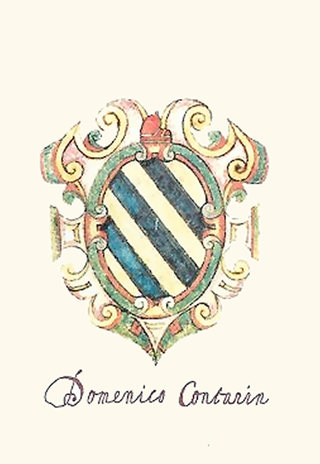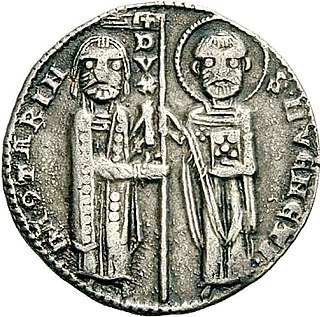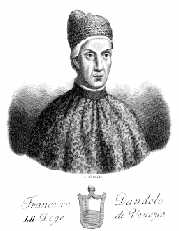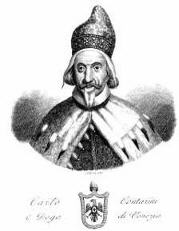
Gasparo Contarini was an Italian diplomat, cardinal, and Bishop of Belluno. He advocated for dialogue with Protestants during the Reformation. Born in Venice, he served as the Republic's ambassador to Charles V during its war with him. He was the first to explain the time discrepancy in the Magellan–Elcano circumnavigation due to Earth's rotation. He participated in diplomatic efforts and reconciliations, and became a cardinal, even though he was initially a layman. Contarini was a leader in the reform movement within the Roman Catholic Church. He played a role in the papal approval of the Society of Jesus (Jesuits). He was also involved in attempts to restore religious unity in Germany.

The Patriarch of Venice is the ordinary bishop of the Archdiocese of Venice. The bishop is one of only four patriarchs in the Latin Church of the Catholic Church. The other three are the Patriarch of Lisbon, the Patriarch of the East Indies and the Latin Patriarch of Jerusalem. Presently, the only advantage of this purely formal title is the bishop's place of honor in papal processions. In the case of Venice, an additional privilege allows the patriarch, even if he is not a cardinal, the use of the colour red in non-liturgical vestments. In that case, the red biretta is topped by a tuft, as is the custom with other bishops who are not cardinals.

The Contarini is one of the founding families of Venice and one of the oldest families of the Italian Nobility. In total eight Doges to the Republic of Venice emerged from this family, as well as 44 Procurators of San Marco, numerous ambassadors, diplomats and other notables. Among the ruling families of the republic, they held the most seats in the Great Council of Venice from the period before the Serrata del Maggior Consiglio when Councillors were elected annually to the end of the republic in 1797. The Contarini claimed to be of Roman origin through their patrilineal descendance of the Aurelii Cottae, a branch of the Roman family Aurelia, and traditionally trace their lineage back to Gaius Aurelius Cotta, consul of the Roman Republic in 252 BC and 248 BC.

This is a list of the Patriarchs of Grado.

Domenico Contarini was the 30th Doge of Venice. His reign lasted from his election in 1043 following the death of Domenico Flabanico until his own death in 1071. During his reign, the Venetians recaptured Zadar and parts of Dalmatia that had been lost to the Kingdom of Croatia in the previous few decades. The Venetian naval fleet was heavily built up during his reign, the economy thrived, and the Republic of Venice had reasserted its control over much of the Mediterranean Sea.

Jacopo Contarini (Giacomo) was the 47th Doge of Venice, from 6 September 1275 to his abdication on 6 March 1280.
The Venetian grosso is a silver coin first introduced in Venice in 1193 under doge Enrico Dandolo. It originally weighed 2.18 grams, was composed of 98.5% pure silver, and was valued at 26 denarii. Its name is from the same root as groschen and the English groat, all deriving ultimately from the denaro grosso.

Francesco Dandolo was the 52nd Doge of Venice. He ruled from 1329 to 1339. During his reign Venice began its policy of extending its territory on the Italian mainland.

The Diocese of Belluno-Feltre is a Latin diocese of the Catholic Church located in the Veneto, northern Italy, organized in its current form in 1986. From 1197 to 1762, and again from 1818 to 1986, the Diocese of Belluno and the Diocese of Feltre were united under a single bishop, with the name diocese of Belluno e Feltre. The current diocese is a suffragan of the Patriarchate of Venice.

Nicolò Contarini, was the 97th Doge of Venice from 2 January 1630 until his death in 1631. During his tenure the Italian plague of 1629–1631 reached Venice, killing one third of the population.

Carlo Contarini was the 100th Doge of Venice from 27 March 1655 until his death in 1656.

Alvise Contarini was the 106th Doge of Venice from his election on 26 August 1676 until his death in 1684. He was the eighth and final member of the House of Contarini to serve as Doge of Venice.

Ca' Farsetti is a palace in Venice, Italy. It is located in the sestiere (district) of San Marco, and faces the Grand Canal, not far from the Ponte di Rialto. The neighboring building is Palazzo Cavalli.
Giovanni Polani was Bishop of Castello, Italy, from 1133 to 1164. He was engaged in a long-running dispute over jurisdiction with Enrico Dandolo, the Patriarch of Grado.

The Diocese of Castello, originally the Diocese of Olivolo, is a former Roman Catholic diocese that was based on the city of Venice in Italy. It was established in 774, covering the islands that are now occupied by Venice. Throughout its existence there was tension between the diocese, the Patriarchate of Grado to which it was nominally subordinate, and the Doge of Venice. Eventually in 1451 the diocese and the patriarchate were merged to form the Archdiocese of Venice.
Enrico Contarini was a Venetian priest who was Bishop of Castello from 1074 to 1108.
Events during the year 1100 in Italy.
Bernardino Fenier was a Roman Catholic prelate who served as Bishop of Chioggia (1487–1535).
The Diocese of Torcello or Diocese of Turris was a Roman Catholic diocese located in the town of Torcello in the province of Venice in northeastern Italy. In 1818, it was suppressed to the Patriarchate of Venice.

Piero or Pietro Contarini (1578–1632) was a Venetian aristocrat and ambassador to Turin, Paris, London, Madrid and Rome.













